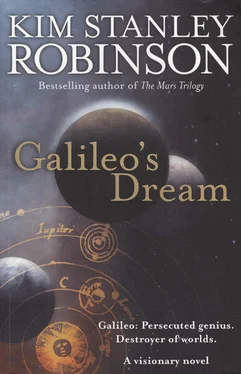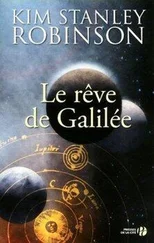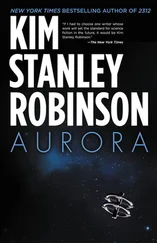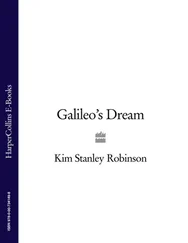Almost all of the material had been in his mind, or at least in his notes, since before 1609, when the arrival of the telescope had upended his life. He had noted and sketched the various raw propositions during the intense collaboration with Mazzoleni in the Padua workshop, thinking at the time that he would write them up formally in book form during the following school year. Now it was thirty years since he had stopped, and some of the notes had been transcribed by Guiducci and Arrigheti, but most of the notebooks he had not even opened again since that time. Some pages he even had serious trouble understanding. It was like reading the handwriting of another man; and he supposed that was actually the case, because now he was only revising the work of an entirely different Galileo, a younger and more nimble mind. What if all those past selves don’t count, he thought as he looked at the notebooks, no matter how much they wrote down? What if the person you are now is really the only person that matters? Because that’s how it is.
So he worked, and lost himself in geometries. The horrible year 1634 passed. A whole crop grew in the fields, there was weed after weed to kill, and after a while he grew unable to recognize his grief as something discrete. It was now simply the world, the way things were.
Pages piled up. He kept using the format of dialogues between Salviati, Sagredo, and Simplicio. This little defiance was a good sign, we all thought; using those names had not been forbidden, the dialogue form had not been forbidden, and yet they would remind everyone of the book that had been forbidden. Of course it was likely they would ban this one before it was ever published. The Dialogo and the Discorsi —two very dangerous books, being so real.
He found it interesting to read over his old notes and diagrams. As he did so, he could not help but recall also all the other things that had happened in Padua when he had been writing these pages. Eighteen long years of teaching mathematics to the students at Il Bo and living in the house on Via Vignali—lecturing, tutoring, working on the military compass, inventing new devices, trying to determine various qualities and properties in the workshop demonstrations. Here was a page on the weight of air as compared to water, for instance. Then also taking the barge out to Venice, to eat and drink and talk with his friends, and play with the 248 girls, and later to see Marina. It was all a jumble, like a kind of carnival inside him, and he could not in fact associate any given experiment with any given year, it was all as one and of a piece: Padua. It was strange how that time felt like it had happened just yesterday, and yet also was separated from him by an abyss of a million years—yet another example of time’s odd doubled aspect. Strange also that he had fought with such fury to escape that life, when it had turned out to be precisely the happiest time he would ever have! How could he have been so stupid? How could he not have known what he had? There was a deep stupidity in ambition, a blindness in it, the way it was so serious, so unplayful. It failed to value the moment, and so failed to recognize happiness, even though that was the most important consideration of all. It failed to value the ringing feeling that had come over him, as when he saw a proof, or on that first night with Marina, or sometimes on the dawn barges back over the lagoon to terra-firma. These were the moments that mattered.
“Mazzoleni, I am stupid.”
“I don’t know, maestro,” the old one objected. “Where does that leave the rest of us?”
“Ha-ha.”
Eventually, these moments he was trapped in now would also meld together and become all of a piece: the mornings splayed in the garden, the afternoons working on the new dialogues; the grief for Maria Celeste, infusing everything with its black light. Arcangela turning her head away when he visited, the look that was not a look, and thus worse than any look, which at the very least was a contact. His sister-in-law, Anna Chiara Galilei, moving into Il Gioièllo with three daughters and her youngest son Michelangelo, then all five of them promptly dying of the plague. More black light piercing all; all part of the one thing of this particular time.
People continued to write to him, and one morning that fall, he got up and stacked up all their letters and started writing back. He answered questions, and inquired about other people’s physical or mathematical investigations, and told people about the new dialogues he had begun. It was of course unlikely he could ever have these dialogues published. That he was using the same three characters only increased the difficulty. So when a correspondent he had never met, Elia Diodati, wrote from Holland asking him if he could help with publication of a new book, Galileo quickly agreed.
At first this seemed like a good thing; but we noticed that Galileo soon began to create more requirements for the book, so that it appeared he would never be able to finish it. It became obvious he didn’t want to finish it, that for him that would be like finishing his life. He was trying to fit in everything he had ever learned, or even thought to be possible—everything but the cosmological matters he was forbidden to discuss. Those in any case remained speculative matters, mysterious no matter how hard one tried to see into them—as was made clear by the confounding information coming in from correspondents about tide times in the Atlantic, which made his theory of how tides were formed seem clearly wrong, as he had to admit in his replies.
Whereas on the other hand, with these simple propositions about motion, force, friction and strength, he could stick to only those assertions that he had demonstrated by experiment. After all the guesses about comets and stars and sunspots, about buoyancy and magnetism and all the fascinating mysteries he did not have any basis for comprehending, that were in the end the equivalent of astrology, it was a tremendous pleasure to write down only what he had seen and tested. “This is the book I should have written all along,” he said one day as he finished writing. “This and only this. I should have avoided words and stuck to equations, like Euclid.”
Let AC be the inclined plane and AB the perpendicular, each having the same vertical height above the horizontal, namely, BA; then I say, the time of the descent along the plane AC bears a ratio to the time of fall along the perpendicular AB, which is the same as the ratio of the length AC to AB.
Space and time, in a relation. So satisfying! A little bell rings!
In the new book’s first day of dialogue, there in the pink ark of Sagredo’s palazzo on the Grand Canal in his mind, he had Salviati, Sagredo, and Simplicio discuss the following subjects: ratios of size to strength in machines; the strength of braided rope; a method for separating the action of the vacuum from other causes; the breaking point of a column of water, which was always eighteen cubits; the role of fire in liquefying hot metals; the paradox of an infinite within an infinite; the geometry of shrinking surfaces; an experiment that might determine the speed of light; problems and theorems in projective geometry; questions of buoyancy and the speed of falling objects; the question of why water beads up on some surfaces; what terminal velocity is, and air resistance, as well as water resistance and the resistance of a vacuum; results of attempts to weigh air, to find out the ratio of the weight of water to air (which was forty to one, not Aristotle’s ten to one); results from the experiments on inclined planes to measure the speed of falling objects; designs for pendulums made of different materials; questions of percussion and impact; and lastly, a long discussion of harmonies and dissonances in music, explained as functions of proportion in vibrations of a pendulum string, with speculations as to why such strong emotions could be created by such sounds.
Читать дальше
Конец ознакомительного отрывка
Купить книгу












